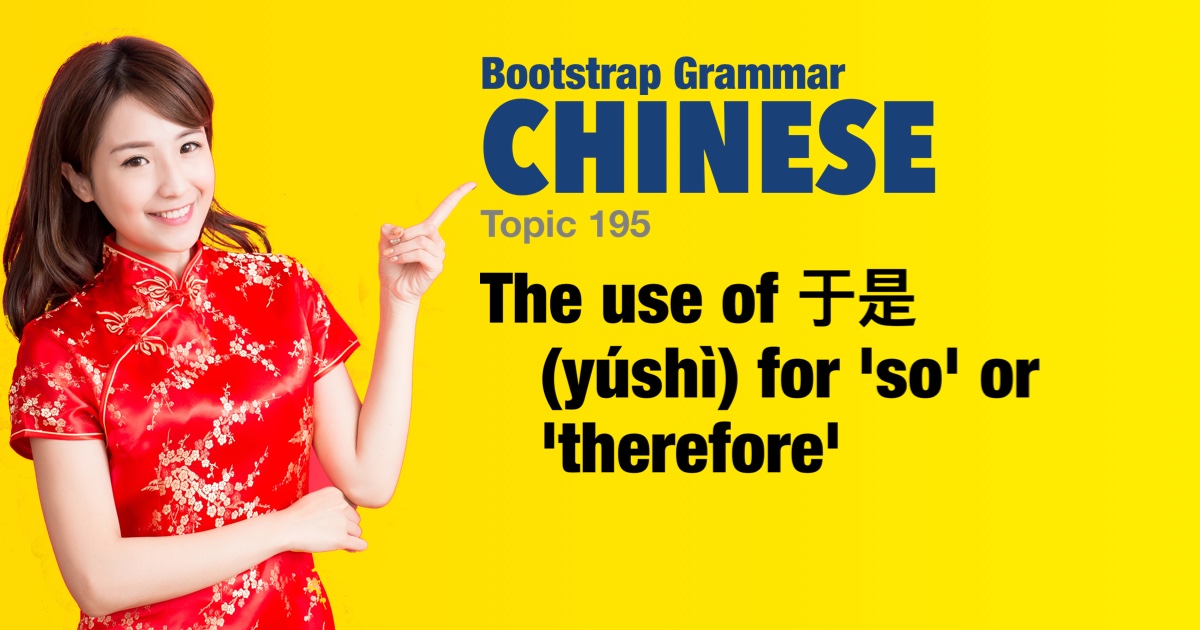Chinese grammar - The use of 于是 (yúshì) for 'so' or 'therefore' |
|||
|
|||
In Chinese, the conjunction 于是 (yúshì) is used to indicate a logical sequence of events or actions. — This is similar to 'and so' or 'therefore' in English. We previously saw 所以 (suóyǐ) used in a similar way, but 于是 has a stronger sense of immediate consequence or logical sequence compared to 所以. |
| Examples: | |
|
天开始下雨了,于是我们赶快找地方躲避。
tiān kāishǐ xiàyǔ le,#yúshì wǒmen gǎnkuài zhǎo dìfang duǒbì. It started raining, so we quickly looked for a place to take shelter.
|
|
|
他累了,于是他坐下休息。
tā lèi le,#yúshì tā zuòxià xiūxi. He was tired, so he sat down to rest. |
|
|
她忘了带伞,于是她被淋湿了。
tā wàng le dài sǎn,#yúshì tā bèi línshī le. She forgot to bring an umbrella, so she got wet.
|
|
|
电梯坏了,于是我们爬楼梯。
diàntī huài le,#yúshì wǒmen pá lóutī. The elevator was broken, so we climbed the stairs.
|
|
|
电影结束了,于是我们去吃晚饭。
diànyǐng jiéshù le,#yúshì wǒmen qù chī wǎnfàn. The movie ended, so we went to have dinner. |
|
|
他迷路了,于是他问路人怎么走。
tā mílù le,#yúshì tā wèn lùrén zěnme zǒu. He got lost, so he asked a passerby for directions.
|
|
|
手机没电了,于是我去找充电器。
shǒujī méidiàn le,#yúshì wǒ qù zhǎo chōngdiànqì. The phone ran out of battery, so I went to find a charger.
|
|
|
他受伤了,于是他去医院。
tā shòushāng le,#yúshì tā qù yīyuàn. He got injured, so he went to the hospital.
|
|
|
天气变冷了,于是她穿上了外套。
tiānqì biàn#lěng le,#yúshì tā chuānshàng le wàitào. The weather turned cold, so she put on a coat. |
|
|
他忘了带钥匙,于是他进不了家门。
tā wàng le dài yàoshi,#yúshì tā jìnbùliǎo le jiāmén. He forgot to bring his keys, so he couldn't get into the house.
|
|
|
他发现了错误,于是他立即改正了。
tā fāxiàn le cuòwù,#yúshì tā lìjí gǎizhèng le. He discovered the mistake, so he corrected it immediately.
|
|
|
照片掉在地上,于是我捡起来了。
zhàopiàn diàozài dìshàng,#yúshì wǒ jiǎnqǐlai le. The photo fell on the ground, so I picked it up.
|
|
|
食物不够,于是我们又去买了一些。
shíwù bú gòu,#yúshì wǒmen yòu qù mǎi le yìxiē. There wasn't enough food, so we (again) went to buy some more.
|
|
 |
|




